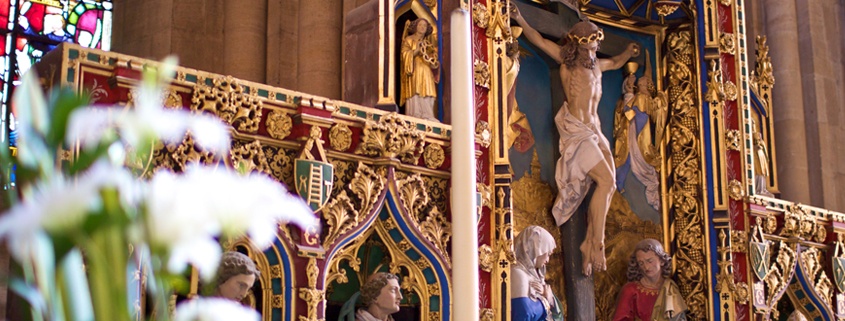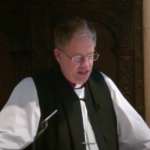Easter Day sermon
Bishop Steven gave the following address at Christ Church Cathedral on Easter Day:
A very happy Easter to one and all. May you know the peace and joy of the risen Christ. As many have said, today we celebrate the great unlocking of the tomb. Christ is risen. He is risen indeed Alleluia.
This seems a good year to reflect on the emotional depth and range of the Easter stories. The people we meet are more than sketches or cartoons. They think and feel and respond as we do in all of our complexity. They are authentic witnesses of the resurrection – not only because of what is said but the ways in which they receive the news.
Mark describes the fear of the first women to come to the tomb. Luke tells us of the grief and anger of the disciples on the Emmaus road, which blinds them to the truth. And John, blessed John, walks us through seven meetings, seven encounters with the risen Lord and the inner journeys they represent.
Easter is a season for a reason
A season of 50 days, not one. The reason is more than the time we need to celebrate. The reason is the depth of change which is needed in our hearts, the difference which is made by the resurrection. Year by year we revisit this truth, which in turn changes everything.
This year, I think, here and everywhere, we need this season perhaps more than ever in our lives as we emerge from the first year of the pandemic, hopeful but unsure of what lies ahead. We need this season and the communities we serve need this season. In the words of the great Easter hymn:
When our hearts are wintry, grieving, or in pain,
Jesus’ touch can call us back to life again,
Fields of our hearts that dead and bare have been:
Love is come again like wheat that springeth green
So what then are these great transformations of the heart which John describes in his gospel? John loves the number seven: seven signs; seven ‘I am’ sayings; seven disciples fishing by the lakeshore; seven labours; seven transformations for the Easter season which we will need and our world needs in these 50 days to come. The seven labours of Easter.
First the change from grief to wonder, which is not the work of a moment. Mary comes grieving, bringing spices to anoint the body of the Lord. The stone has been removed. She runs to Simon Peter and the disciple Jesus loved. Together they run to the tomb. It is indeed empty. The men return to their homes, presumably from fear.
But Mary stays, weeping. The grief and pain are immense. Her life and love is gone. But then the change begins. First she looks in the tomb. Then she hears the words of the angels. Then she sees Jesus, but does not see him. Then he speaks her name. And then her grief is turned to wonder.
From fear to peace
Second the change from fear to peace. The disciples gather in a locked upper room, terrified for their lives. Jesus came and stood among them. His first word to them is a word of peace, which we will echo in our Eucharist this morning as we greet one another.
The third labour also in the upper room is the journey from loneliness to friendship: Jesus breathes on them and says, ‘Receive the Holy Spirit’. The Spirit is the Comforter. We are not left alone. God’s life and breath is joined with our life and breath in resurrection joy.
The fourth labour is from doubt to faith in the story of Thomas, who cannot at first believe. Thomas does not need what he thinks he needs: physical proof. He needs, himself, to meet with Jesus and to rededicate his life to his Lord. Time is needed.
The fifth labour is from emptiness, vanity, to fruitfulness in the beautiful story of the catch at the lakeside. The disciples are listless, returning to old ways and unsure despite the resurrection. What will this mean? Again they fish all night and catch nothing. The stranger on the shore is unrecognised at first, until their nets are filled to bursting.
Come and eat
The sixth within the same story is from being hungry to finding the food which will sustain them. When the disciples reach the shore, Jesus has baked bread, lit a fire, prepared fish. Come and have breakfast, he says. Come and eat: the same invitation comes to us this day and each time we share the Eucharist.
And the seventh, walking by the lake, is the journey from failure to forgiveness. Three times Simon Peter denied his Lord. Three times Jesus invites his profession of love. Three times Jesus commissions him to love his imperfect church.
Seven labours: seven journeys. From grief to wonder; fear to peace; loneliness to friendship; doubt to faith; emptiness to fruitfulness; hunger to satisfaction; failure to forgiveness.
This is the work to be done in the 50 days of Easter: serious heart work. This is the journey we need to begin again today as every Easter Day. This is indeed our journey. But the labour is not our labour.
This heart work is Christ’s, not ours, in two senses. First because all of this resurrection life flows from the work of the cross; Jesus’ death offered for us and for the world. Second because in each of these stories in the gospel, the initiative and the action lie with Jesus and not with his disciples.
So in this Easter season, recognise the heart work which is needed. Put yourself in the way of the risen Christ especially in these next 50 days: in scripture and in sacrament; in the fellowship and in the prayers. At the end of this year, in all that is happening, you may barely have enough faith to be here, clinging on by your fingertips. But you are still here, and the risen Christ is here, and there is hope of grace in that encounter.
Christ is risen. He is risen indeed Alleluia.
When our hearts are wintry, grieving, or in pain,
Jesus’ touch can call us back to life again,
Fields of our hearts that dead and bare have been:
Love is come again like wheat that springeth green
Bishop Steven released a series of reflections over Good Friday. Listen at any time online or search Bishop Steven wherever you get your podcasts.



